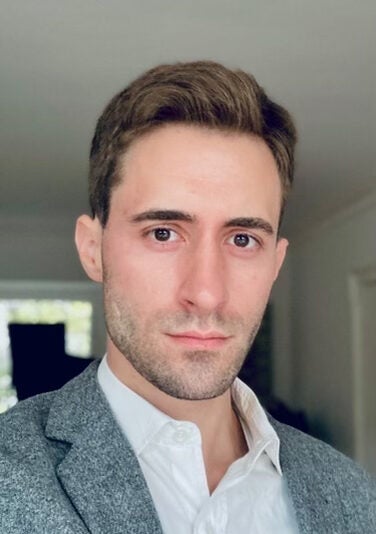By Billy Goulston ’23

On a clear spring day, from the seventh floor of the John Joseph Moakley United States Courthouse, you can see lawyers and other professionals coming and going on sidewalks in Boston’s Seaport District, and sailboats and motorboats and cargo ships and cruise ships crisscrossing the harbor, and airplanes descending toward Logan Airport or rising skyward toward destinations unknown. Yet even these sights, I realized during my 3L semester in the Judicial Process in Trial Courts Clinic, were not nearly as affecting as what I saw within the brick walls of that waterfront building on One Courthouse Way.
Four credits of clinical work in the chambers of U.S. Magistrate Judge Donald Cabell meant spending Tuesdays and Wednesdays in the courthouse, a mere 40% of potential experiences in the course of any workweek. But packed within those three months of two-day weeks were experiences staggering in both their variety and in their effect. Among the matters I witnessed and worked on were plea hearings and discovery hearings, patent lawyers and patent liars, memos and motions, public corruption and private destruction, the pretrial and the postconviction, mediations and tribulations, attorneys who were sensible and attorneys who were sensational, and proceedings in person and proceedings on Zoom—a surreal throwback to my virtual classes during the 1L days of yore.
More than the subject matter of the Clinic’s jurisdiction, however, I think it was the personal aspects that most discernibly impacted me. Every day I walked into a workspace that varied in age and in gender and in race, and I worked with two very capable clerks whose communication and delegation styles were greatly contrasting and yet both compelling. Outside of the chambers of Judge Cabell, I had a front-row seat to an assortment of advocates, including everyone from Assistant United States Attorneys and public defenders to pro se litigants to BigLaw bigshots reciting oral arguments to the First Circuit and lawyers just trying to scrape by on the finite resources of their one- or two-lawyer firms.
Most harrowing of all: in nearly a dozen pretrial detention hearings, I observed a breadth of men and women, individuals accused of crimes mundane and monstrous, who sat beside their attorneys, sometimes unshackled and always unnerved, their bodies trembling with terror or silent with shock or on multiple occasions struggling amid the throes of drug withdrawal. During each of these pretrial detention hearings, however, I never once felt as though I had become, like Nick Carraway in The Great Gatsby, “privy to the secret griefs of wild, unknown men.” Instead, I felt as if I were bearing witness to the tragic traumas of otherwise normal people whose families were broken and lives were upended by poverty and violence and addiction and sometimes plain-old bad luck.
But for all the different cases and situations and people that I experienced during my time in the Judicial Process in Trial Courts Clinic, there was a powerful common thread that tied it all together: the man in the black robe himself, Judge Cabell. Despite a judicial appointment that required him to wear many hats and perform many responsibilities and occupy many roles, my supervising judge was remarkably even and consistent throughout the semester, his calm and calming demeanor a constant in every case, in every conversation. Regardless of the person to whom he spoke and the topic about which he spoke, Judge Cabell dealt with everyone with a composed humanity. He did not preside over them but simply remained present, letting them have their day in court as he looked on and listened.
Filed in: Clinical Student Voices
Tags: Class of 2023, Judicial Process in Trial Courts Clinic
Contact Office of Clinical and Pro Bono Programs
Website:
hls.harvard.edu/clinics
Email:
clinical@law.harvard.edu